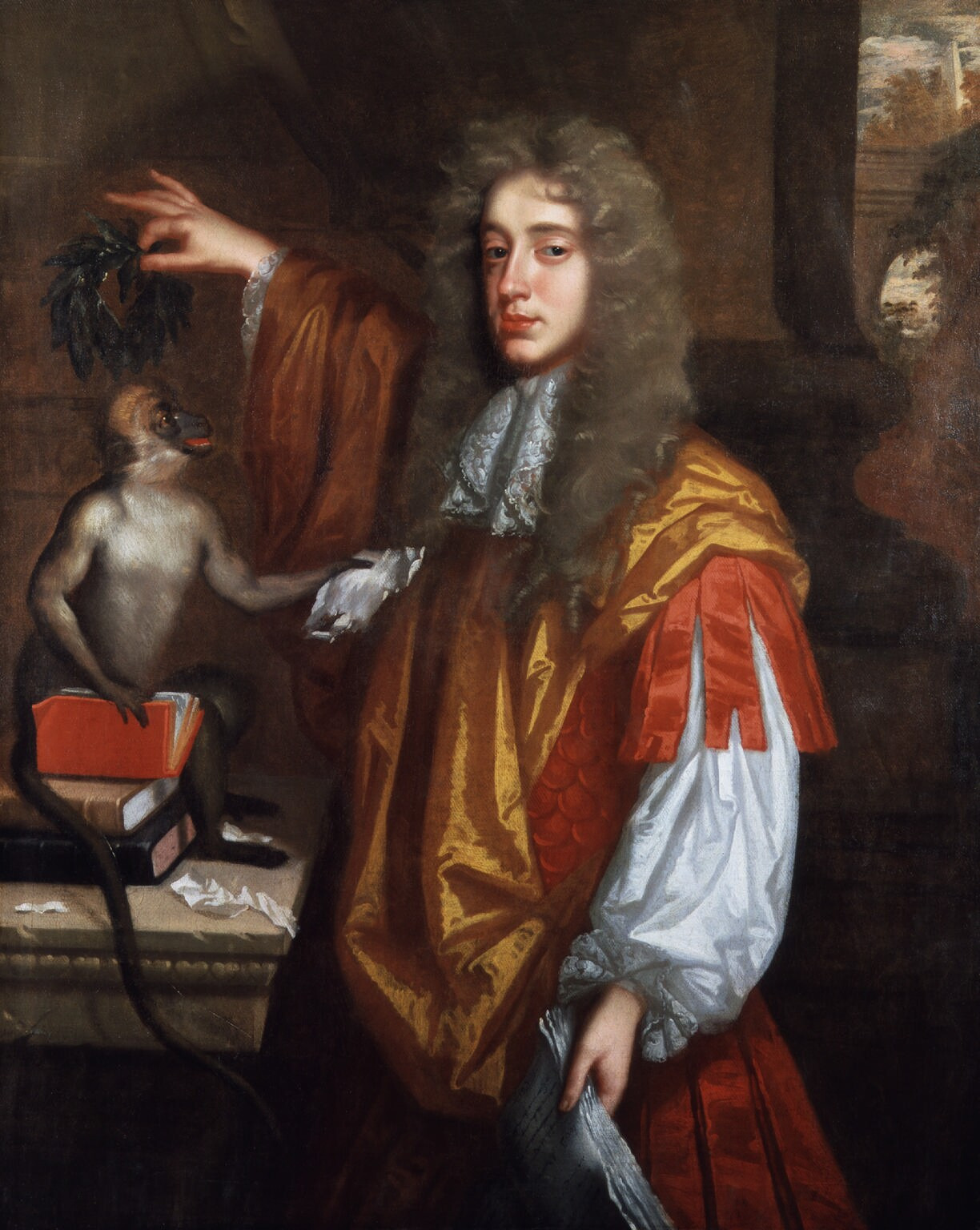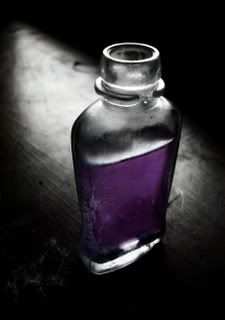 John Wilmot, 2nd Earl of Rochester (April 1, 1647–July 26, 1680) was an English libertine, a friend of King Charles II, and the writer of much satirical and bawdy poetry.
John Wilmot, 2nd Earl of Rochester (April 1, 1647–July 26, 1680) was an English libertine, a friend of King Charles II, and the writer of much satirical and bawdy poetry.
He was the toast of the Restoration court and a patron of the arts. He married an heiress, Elizabeth Malet, but had many mistresses, including the actress Elizabeth Barry. He was widely reported to have renounced atheism on his deathbed.
Life
Rochester was born in Ditchley, Oxfordshire. His mother Anne St. John, Countess of Rochester was a Parliamentarian by descent and inclined to Puritanism. His father Henry Wilmot, a hard-drinking Royalist from Anglo-Irish stock, had been created Earl of Rochester in 1652 for military services to Charles II during his exile under the Commonwealth; he died abroad in 1658, two years before the restoration of the monarchy in England.
At age twelve, Rochester matriculated at Wadham College, Oxford, and there, it is said, "grew debauched". At fourteen he was conferred with the degree of M.A. by Edward Hyde, Earl of Clarendon, who was Chancellor to the University and Rochester's uncle. After carrying out a Grand Tour of France and Italy, Rochester returned to London, where he graced the Restoration court. Later, his courage in a sea-battle against the Dutch made him a hero.
In 1667 he married Elizabeth Malet, a witty heiress whom he had attempted to abduct two years earlier. Samuel Pepys describes the event in his diary for 28 May 1665
"Thence to my Lady Sandwich's, where, to my shame, I had not been a great while before. Here, upon my telling her a story of my Lord Rochester's running away on Friday night last with Mrs Malet, the great beauty and fortune of the North, who had supped at Whitehall with Mrs Stewart, and was going home to her lodgings with her grandfather, my Lord Haly, by coach; and was at Charing Cross seized on by both horse and footmen, and forcibly taken from him, and put into a coach with six horses, and two women provided to receive her, and carried away. Upon immediate pursuit, my Lord of Rochester (for whom the King had spoke to the lady often, but with no success) was taken at Uxbridge; but the lady is not yet heard of, and the King mighty angry and the Lord sent to the Tower."Rochester's life was divided between domesticity in the country and a riotous existence at court, where he was renowned for drunkenness, vivacious conversation, and "extravagant frolics" as part of the Merry Gang (as Andrew Marvell called them). The Merry Gang flourished for about fifteen years after 1665 and included Henry Jermyn; Charles Sackville, Earl of Dorset; John Sheffield, Earl of Mulgrave; Henry Killigrew; Sir Charles Sedley; the playwrights William Wycherley and George Etherege; and George Villiers, Duke of Buckingham. It is very likely that Rochester was bisexual, a fact that is reflected in much of his poetry.
Banished from court for a scurrilous lampoon on Charles II, Rochester set up as "Doctor Bendo", a quack physician skilled in treating barrenness. His practice was, it is said, 'not without success,' implying his intercession of himself as surreptitious sperm donor. He was involved with the theatre and was the model for the witty, poetry-reciting rake Dorimant in Etherege's The Man of Mode (1676). According to an often repeated anecdote, his coaching of his mistress Elizabeth Barry began her career as the greatest actress of the Restoration stage.
By the age of thirty-three Rochester was dying, presumably from syphilis, other venereal diseases, and the effects of alcoholism. He famously attended Parliament at a late stage of illness, his rotting nose concealed beneath a silver nasion and his facial gummata beneath pancake makeup. His mother had him attended in his final weeks by her religious associates, particularly Gilbert Burnet, later Bishop of Salisbury. A deathbed renunciation of atheism was published and promulgated as the conversion of a prodigal. This became legendary, reappearing in numerous pious tracts over the next two centuries. This story is however suspect because the publisher of this "conversion" was Burnet, who had often criticised Rochester during his life and may have used a false conversion to further his own goals. Rochester was later buried at Spelsbury Church in Spelsbury, Oxfordshire.
Works and influence
Rochester's poetry was greatly influenced by John Donne's works, his metaphysical predecessor, and whilst lacking the poetic skills of his contemporaries, he more than made up for this with his sharp tongue and acerbic wit. His most famous verse is a teasing epigram of his great friend King Charles II:
We have a pretty witty king,Charles is reputed to have replied:
Whose word no man relies on;
He never said a foolish thing,
Nor ever did a wise one.
"That is true; for my words are my own, but my actions are those of my ministers."Rochester's writings were at once admired and infamous. A Satyr Against Mankind (1675) is a scathing denunciation of rationalism and optimism that contrasts human perfidy with animal wisdom, and the History of Insipids (1676) is a devastating attack on the government of Charles II.
During his lifetime, his songs and satires were known mainly from anonymous broadsheets and manuscript circulation; most of Rochester's poetry was not published under his name until after his death. However, before his death, Burnet claimed Wilmot experienced a religious conversion recanting his past, and ordering “all his profane and lewd writings” burned, though this story is highly suspect given the rivalry between the two. It is possible that Burnet used this "conversion" to suppress Wilmot's anti-religious work. His single dramatic work is Valentinian (1685).
Interestingly, his most well-known dramatic work Sodom, or the Quintessence of Debauchery, has never been successfully proven to be written by the earl. However, supposed posthumous printings of Sodom gave rise to prosecutions for obscenity, and were destroyed. On 16 December 2004 one of the few surviving copies of Sodom was sold by Sotheby's for £45,600.
Rochester has not lacked distinguished admirers. His contemporary, Aphra Behn, lauded him in verse and also based several rakish characters in her plays on Rochester. Daniel Defoe quoted him often. Tennyson would recite from him with fervour. Voltaire, who spoke of Rochester as "the man of genius, the great poet", admired Rochester's satire for "energy and fire" and translated some lines into French to "display the shining imagination his lordship only could boast." Goethe could quote Rochester in English, and cited his lines to epitomise the intensely "mournful region" he encountered in English poetry. William Hazlitt judged that "his verses cut and sparkle like diamonds", while "his contempt for everything that others respect almost amounts to sublimity."
In drama and film
A play of Wilmot's life, The Libertine, was written by Stephen Jeffreys, in 1994, and was staged by the Royal Court Theatre.
 The film The Libertine, based on the play, was shown at the 2004 Toronto Film Festival and was released in the UK on November 25, 2005. It chronicles (while taking some artistic liberties) Rochester's life, with Johnny Depp as Rochester, Samantha Morton as Elizabeth Barry, John Malkovich as King Charles II, and Rosamund Pike as Elizabeth Malet.
The film The Libertine, based on the play, was shown at the 2004 Toronto Film Festival and was released in the UK on November 25, 2005. It chronicles (while taking some artistic liberties) Rochester's life, with Johnny Depp as Rochester, Samantha Morton as Elizabeth Barry, John Malkovich as King Charles II, and Rosamund Pike as Elizabeth Malet.The play The Ministry of Pleasure by Craig Baxter also dramatises Wilmot's life and was produced at the Latchmere Theatre, London in 2004.
source: wikipedia




0 comments:
Post a Comment